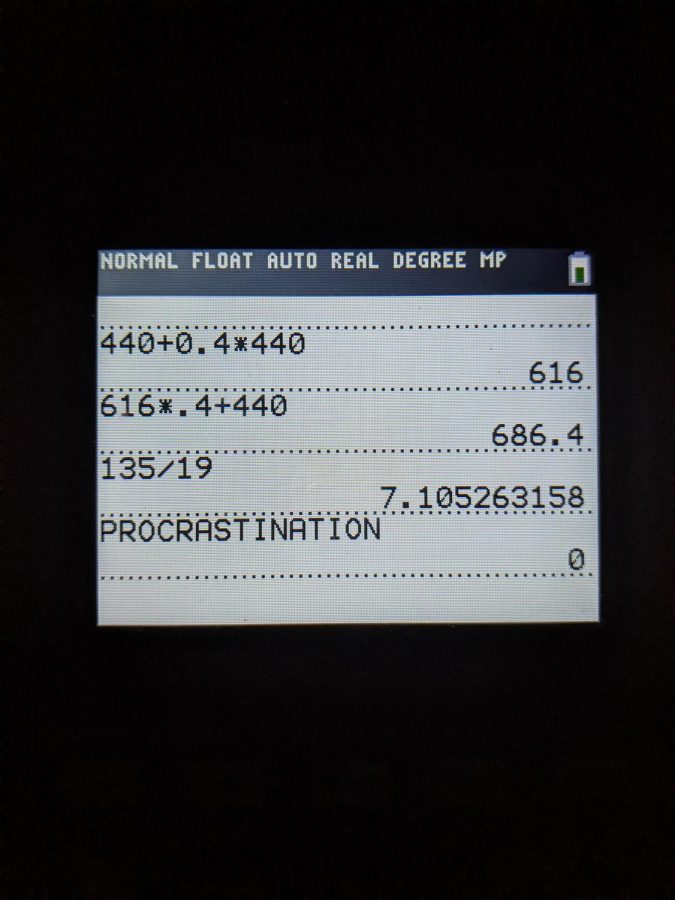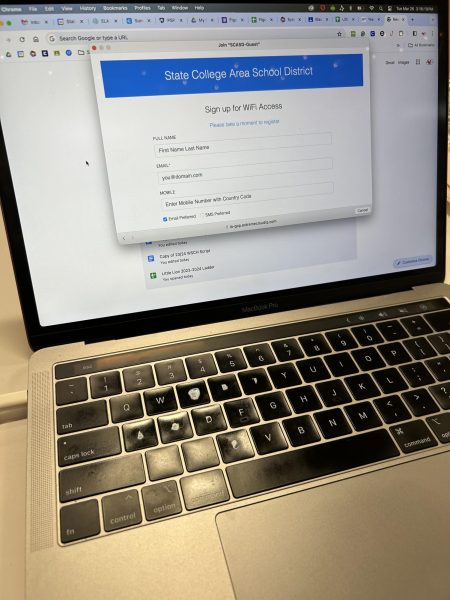Procrastination Complex
‘PROCRASTINATION’ written on a TI-84 Calculator, representing the schoolwork many students procrastinate.
January 12, 2023
Procrastination is “the action of delaying or postponing something,” as stated by Oxford Languages. Pro– and –cras– originate from Latin, meaning forward and tomorrow. The gist of the stems mean to push forward to tomorrow. Procrastination is common in many students.
Just this weekend, I was bundled up in blankets sitting on my bed reading, trying to avoid the math homework whose deadline seemed to loom over my head. As I relaxed leisurely, it stuck in the back of my mind, nagging me over and over and over again. In this way, my relaxation was riddled with guilty feelings and pestering thoughts.
But even through these thoughts and feelings, I continued again to procrastinate this exact assignment the morning before writing this. If procrastination comes in a package with dread and apprehension, why do we continue to do it?
Bryan Wang, a freshman, explained his thought process leading up to procrastination. “Sometimes it’s not really a conscious choice, it’s more like, ‘oh I’ll do it a bit later,’ but I never end up doing it later. […] Though you know, having a shorter deadline or simply being a one-day assignment definitely helps with the procrastination. For me, it [the problem] is more long-term procrastination than short-term,” he said.
From a different point of view, freshman Esra Aydin shared, “I feel like at times I put on a middle school work mindset when I’m handling high school work which does lead me to be overwhelmed because I’m not so used to high school yet.”
To answer this question from a scientific angle, we must take a trip into the neuroscience and history of procrastination. We know from historical texts and philosophers that procrastination has dated back to Ancient Greece. It’s only logical that something both so ancient and modern is embedded in human biology.
Arguments and battles within ourselves that often lead to procrastination are biologically between the limbic system and prefrontal cortex.
The limbic system and prefrontal cortex are the two main components of the brain that control much of our mental lives. The limbic system, also known as the reptilian brain or paleomammalian brain, is the system that evolved first and controls impulsive, emotional, and behavioral actions.
Opposingly, the prefrontal cortex controls logical thinking, self-control, and rational decision-making. In this way, we can observe how the two might conflict and argue, and how procrastination may result from the stronger, more ancient limbic system winning the internal argument. Information regarding the neuroscience of procrastination from Ness Labs.
However, there are ways to fight against the impulse to procrastinate, and there are also other factors that may determine how much one procrastinates, and even why some of us are more prone to procrastination.
One of these factors may be whether deadlines are present or not. Let’s assume that deadlines are examples of tasks like schoolwork, applications, duties, etc, and tasks without deadlines represent extracurricular hobbies, goals, emotional journeys, and future endeavors among others. Both of these categories of tasks require them to be completed at some point or another, but deadlines and due dates provide you a date to complete by. Although people may procrastinate until the deadline is near – forcing them to panic – the task gets done either way.
“One way you can view stress is as a response in our body that motivates us to do something. When we’re feeling stressed about something we usually want to do something about it to get rid of that gross feeling. And so we think about stress as something that activates our body to do things, then due dates are hugely important,” described Molly Mazal, school psychologist for State High.
However, when there is no deadline, does the task get pushed on indefinitely?
The answer is usually no, but how long it gets pushed forward is determined by the completer and their motivation to do tasks. Whether it be because of simple burnout, or a fear of failure, some factors will decrease motivation to do a task, even simple ones.
Different personality types may also lead to a lack of motivation and procrastination. Those with a higher work ethic may want to get their work done faster and start right away. On the other hand, those with more impulsive or reward-oriented personalities might wait until the deadline is incredibly close and instead do things they enjoy first.
Other reasons for why people procrastinate include lack of motivation, fear and anxiety, depression, low self-esteem, low attention-span, perfectionism, being faced by a daunting task, etc.
A more recent, global reason is the COVID-19 pandemic. As thousands of schools shut down, turning to online school, many students felt a change in the division between their school life and personal life. As these two merge, a lack of motivation is often present and can cause students to spiral into anxiety. The students’ anxiety and lack of motivation can cause an increase in procrastination.
The reason this is such a problem is because procrastination often turns into a habit, a cycle. Oftentimes, the things people are doing while procrastinating is enjoyable for them, and causes people to associate procrastination with something fun and rewarding, encouraging them to procrastinate more, even if they know their future self might suffer because of it.
Since being affected by the COVID-19 pandemic, a lot of the students in school now are struggling from their past habits of procrastination.
Additionally, the quality of the task completed after procrastination largely varies from person to person.
In response to the question of how the quality of work is affected by procrastination, Mazal responded, “I think it depends on the way that the individual responds to and views stress. […] Maybe you need a certain amount of stress, or a certain amount of procrastination […] to activate you to do something, and then you’re really focused, […] but I put a big asterisk because I think generally when most people by the time they’re stressed after procrastinating, they often times haven’t left themselves enough time to do the best work that they could do.”
To combat procrastination, here are some strategies to try that may help you to complete your task. However, note that not all of these strategies will work for everyone, and that individuals should find what methods work best for themselves.
1. Holding yourself accountable.
A lot of the time, it’s helpful to place yourself in a situation where you force yourself to do the task. When you hold yourself accountable, by studying in public or with a friend for example, you’re less likely to back down and surrender to doing something more enjoyable.
2. Breaking the task down into smaller chunks.
Allowing yourself to look at the task and separate it into different chunks can make it easier to get started. After you get started, all you have to do is not lose momentum.
3. Create a reward system.
After doing a task, give yourself a reward of some sort, to associate something positive with overcoming your fears or finishing something you didn’t want to do.
4. Create a comfortable study environment.
Music, comfy clothes, and aesthetic stationery can sometimes make getting started easier, and let you build momentum to finish your tasks.
5. Try new study strategies.
Sometimes, studying in boring and mundane ways can contribute to procrastination. Switching it up and trying new things can make studying more bearable, and help you to find strategies that work for you.
6. Create habits.
“To actually create lasting behavior change, start small and go from there. [..] Really to be able to get out of patterns of behavior that you’re in that arent good it really has to be a habit,” states Mazal.
To conclude, keep in mind that procrastination has been a natural behavioral habit from ancient times, and that many factors contribute to it. However, also keep in mind that it is possible to break out of procrastination habits through different strategies.












